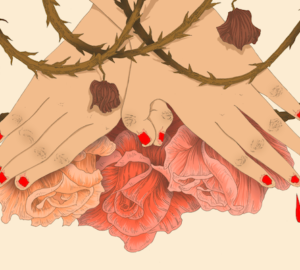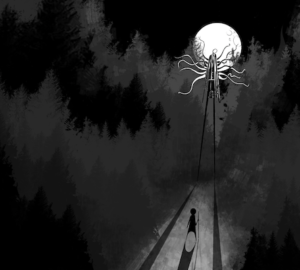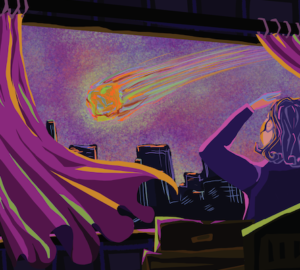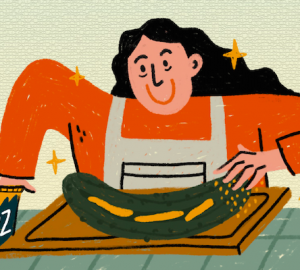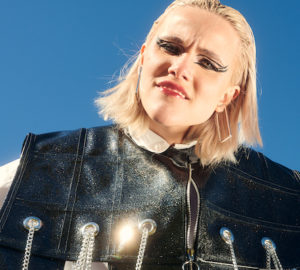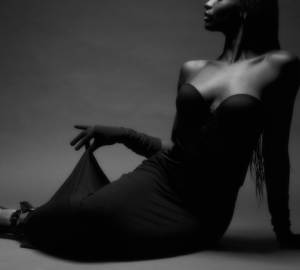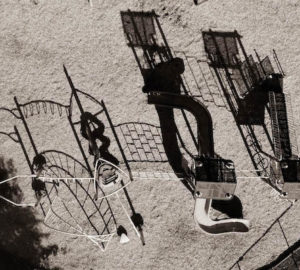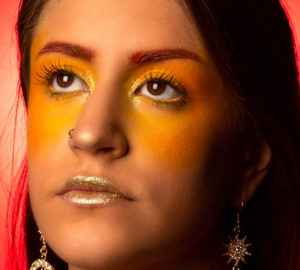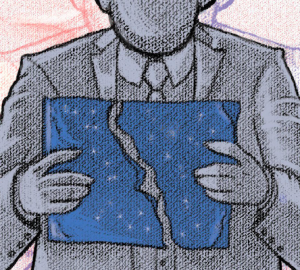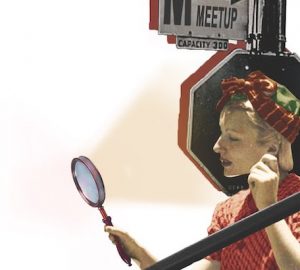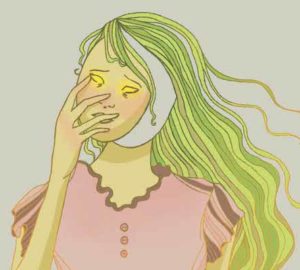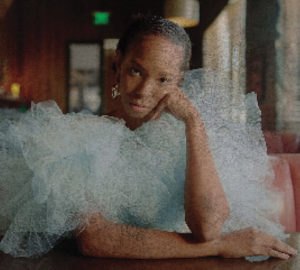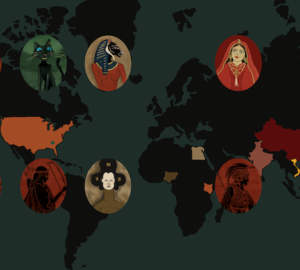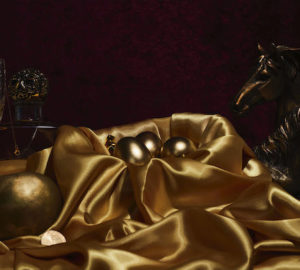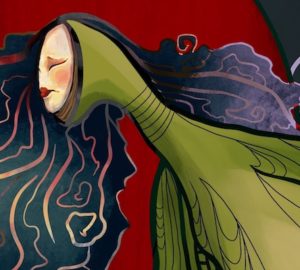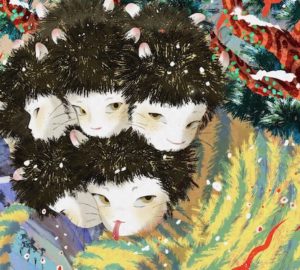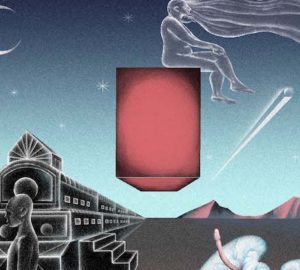Written by Stephanie Dejak
Illustration by Riley Sullivan
Typography by Fon Limsomwong
The two of them pulled into the driveway of a two-story house in a cookie cutter neighborhood. The leaves had just started to fall from the maple tree in the front yard, but not enough to hide the perfectly trimmed lawn underneath. Autumn in the crisp New Jersey suburbs was in full effect.
“Hopefully we’ll be in and out,” Eli said. “Don’t stress.”
Mia swallowed the lump in her throat, following him up the stairs to the front door. She could hear the soft party chatter pouring out from behind it before he even rang the doorbell. A blonde woman answered it.
“Oh, look who’s here!”
“Is that him?” someone yelled from the living room.

“Eli!” said another woman, appearing in the entryway. Wiping his Sperry’s on the welcome mat first, he walked inside to greet her. The woman had orange hair that matched his, and as Mia looked closer inside, she noticed that most of the others did, too.
“You must be Mia,” the woman said with a smile. “I’m Iris, Eli’s aunt.”
“Nice to meet you,” Mia said. “Your home is beautiful.”
As they walked further into the house, Mia could see that the dinner preparation was in full swing. One woman with wrinkles and thin orange curls pulled a dish of sweet potato souffle from the oven, fanning its steam away with her oven mitt. Another woman with the same wrinkles stuck a fork into a tender piece of brisket resting in a crock pot. A third with long auburn hair gave the large soup pot on the stove a stir, while two girls about Mia’s age each sliced up an apple.
A wooden spoon clattered onto the counter.
“Oh, hi sweetheart!” said the woman in charge of the soup, noticing Mia. “I’m Eli’s mom. It’s nice to meet you.”
“Hi, Mrs. Altman. It’s nice to meet you, too.” “Oh please, call me Anna.”
Eli approached them with two glasses of cabernet, handing one to Mia.
“Cheers,” she said, clinking their glasses and taking a sip.
“Cheers. Shana Tova,” he said, taking a sip of his own. “Happy New Year.”
“Shana Tova!” said one of the older women, now that the souffle was safe and sound on the kitchen island.
“We should go say hi to everyone else,” Eli said, after all the aunts had introduced themselves. He led her into the living room, where they found ten people squished together around a long card table.
“Is that my grandson?” an old man asked.
“Hi Zayde,” Eli said, extending his hand. His grandfather didn’t quite shake it, he just held it for a second as his own elderly hand trembled. “Mia, this is my grandfather Isaac, my dad, my brother Adam, Uncle Jake, Uncle Aaron, Auntie Josephine, Auntie Marissa, my cousin Rachel, and her husband Mason.”
“Oh, hi everyone,” she said. Anxious about attempting to remember everyone’s name, she took a sip of wine.
“Everyone, this is my girlfriend, Mia.” Mia nearly choked, sending her into a coughing fit. His what? Eli nudged her. He should’ve at least warned her about the sudden drop of the G-word, the one he once swore he’d never say.
“Oh, and my other cousins are around here somewhere,” Eli said. “You’ll meet them later.” Mia let out a nervous laugh. “I almost can’t keep up.” One of the women at the table — Mia had forgotten her name already — laughed too. “It’s a lot to take in.”
“It’s like ‘My Big Fat Greek Wedding,’” Mia whispered into Eli’s neck. “Your big fat what?” he whispered back. “Nothing. It’s a movie. We’ll watch it sometime.” “Everyone,” Bubbe said, emerging from the kitchen. “If we could all gather in the dining room, we’ll get started. It’s almost sunset.”
On the dining room table was a white tablecloth, a silver tray with two matching candlesticks, two white candles, a box of matches, a covered basket of bread and a plate of apple slices with a small dish of honey. She understood why the card table was in the living room now — there’s no way that a family this big could fit comfortably at the dining room table without being split.
“I want to begin by thanking you all for coming,” Bubbe said. “I know it’s rare nowadays that we’re all together at the same time, and I feel very blessed to have my entire family here this Rosh Hashanah.” She smiled. “I also want to thank Josephine for helping me prepare the traditional recipes that our mother taught us many, many years ago, and I’d like to thank my children for continuing to pass these recipes down to our grandchildren. I love you all very much.
“L’shana tova u’metukah,” the crowd murmured.
Bubbe struck a match, using it to light the two candles. Instead of blowing it out, she threw the lit match onto the silver tray, but the matchstick shriveled up too quickly to raise too much concern about the open flame. Bubbe’s hands made three circular motions around the candles before covering her eyes. Mia watched everyone else cover their eyes with their hands too, so she did the same. She listened as the crowd prayed:
“Barukh atah Adonai Eloheinu melekh ha’olam asher kid’shanu b’mitzvotav v’tzivanu l’hadlik ner shel shabbat kodesh.”
When she opened her eyes, Mia watched one of Eli’s uncles lift the breadbasket and uncover it. Before she could recover from the last prayer, the crowd began another one: “Barukh atah Adonai Eloheinu melekh ha’olam hamotzi lehem min ha’aretz.” He tore a piece of the bread, ate it and passed the basket around the dining room. By the time the basket made its way to Mia, both loaves had significant dents in them. She tore off a piece for herself anyway, handing the basket to Bubbe afterward. Then, Josephine picked up the apples and the honey, and the crowd said one more: “Barukh atah Adonai Eloheinu melekh ha’olam borei p’ri ha’eitz.”
“And here’s to a sweet new year,” Josephine said in English, dipping an apple slice into the honey and passing the plate to Mia. The apples were the tiniest bit brown after sitting out for a second too long, but as soon as the honey melted onto her tongue, Mia didn’t care.
“Dinner is ready in the kitchen, so please help yourselves,” Bubbe said.
The kitchen island was covered with so many trays of food that Mia could hardly see its granite countertop anymore. She grabbed a porcelain plate and decided she would try a small spoonful of everything. When her plate was full, she found a seat at the table next to Eli and sat down in front of a steaming hot bowl of soup with a lump in the middle.
“I grabbed some for you,” cousin Rachel said. “Have you ever had matzo ball soup before?”
“No, I haven’t.” She didn’t know what matzo was, but it looked more like a lump than a ball. Regardless, she tore a piece of it off with her spoon, blowing on it before tasting it.
“What do you think?” Eli asked.
“Mmm. I love it,” Mia said. “It’s perfect for this cooler weather.”
“So, how did the two of you meet?” someone asked from the other end of the table. She tensed. This was the moment she’d been dreading all evening. Before she could respond, Eli cut in with his carefully crafted lie. “Picture this: it’s a brutal winter in lower Manhattan, as always, and I’ve somehow made it through another very lonely Valentine’s Day.”

Mia smiled. That part of the story was true.
“And I’m walking around in the snow — way past freezing at this point — and I’m like, ‘Why, God? Why can’t I find a great woman?’”
She made more of an effort to hold her smile now, but it was hard. Seriously? Sure, Eli’s Jewish, but Mia had never heard the guy talk about God, ever. He spent most of his Sunday mornings in her bed with a hangover, not at the synagogue.

“So, I walk past this little coffee shop called Café Belle, and I decide to go in and warm up with an americano. And then I see this beautiful girl typing away on her laptop, sipping a hot chocolate.”
This is ridiculous, Mia thought, still trying to hold her smile. Did he not know that she would’ve ordered an americano too? She wondered if they were actually friends with benefits, or if the benefits were the only thing keeping their arrangement afloat.
“I asked her if I could buy her a cannoli or something, and she said yes. We actually sat there and talked all night until they closed…”
“And the rest is history!” Mia chimed in, fearing that he’d dig himself into a much deeper hole if she didn’t. He could’ve just abstained from telling the truth — he didn’t have to go so far out of his way to lie to his entire family during a religious holiday. Maybe it was her Catholic guilt, but she refused to let the lie grow any worse.
“Aw,” Bubbe said from the other end of the table. “What a nice story to tell your kids someday.” Their kids? Oh, come on. He’d never even taken her on a date before — the closest they’d come to one since matching on Hinge seven months ago was splitting a carton of leftover lo mein on her fire escape one afternoon. Aside from that, it was just casual hookups and pillow talks in the dark.
“Mia, did you try the kugel yet?” Josephine asked. Mia was relieved to change the subject. “I’m sorry, the what?” “The pasta,” Anna said, pointing to her plate.
“That’s pasta?” Mia said in disbelief. “It’s so sweet — I thought I’d accidentally grabbed dessert a little early. It’s delicious.”
“My grandmother’s recipe,” said Josephine. “It has cinnamon in it. And it’s much better when it’s cold. I’ll send some home with you, if you’d like.”
Mia smiled. “I would love that.”
Later, with a tote bag full of leftovers, Mia and Eli waved goodbye to Rosh Hashanah and the Altman family. They’d bought the lie, but Mia’s head was spinning. Why couldn’t he put in the effort to make that story the tiniest bit true?
As Eli put the tote bag in the backseat of his car, their eyes met. Deep down, she wondered if she’d be better off saying goodbye to him, too.



